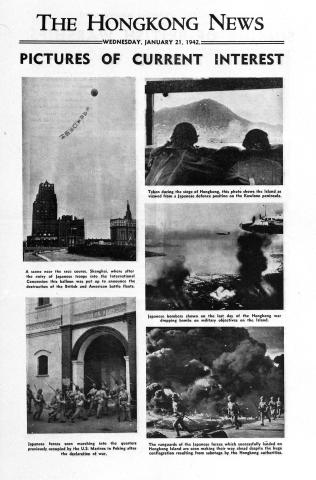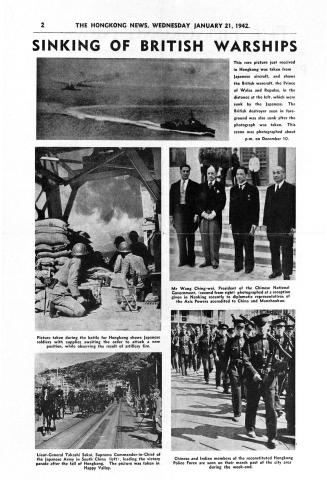In morning, we were given a quarter of an hour to pack and get out of the hotel, then marched down Des Voeux Road. ((I wore most of my clothes, with blanket strapped bandolier-wise across me. Passed Nanking Hotel and saw Olive and colleagues hanging over the verandah watching.))
Then boarded top-heavy Macau steamer and set out for Stanley. It could have been lovely - such a beautiful day, ((We sat on top deck and enjoyed the trip and the freshness after being so long cooped up in hotels; not only ARP personnel, also other groups. How envious I was of ginger-haired Bridget Armstrong and brother John, aged about 10 and 8, because their mother was always handing them thin little biscuits with marmite on during the journey.))
Our boat too big to go right up to the jetty at Stanley, so we had to clamber over the side of the ferry on to the side of the junk - then jump into the body of the junk. Poor Mrs Grant who weighed over 15 stone, cried from the side of the ferry that she just couldn't make the transfer, but somehow she did. ((Mrs Kathleen Grant was the mother of one of my Govt. colleagues Rosaleen - R had married shortly before the Jap attack; she was a VAD at Bowen Road Hospital.))
From jetty a path across beach led to a steep bank, near St Stephen's Preparatory School. Dorothy Holloway, a fellow Govt. stenographer, was at the top of the bank extending a helping hand to every one as we made the last leap up to flat ground. When she saw Bonnie Penny who was just in front of me, she told her that her mother Mrs Robinson was already in Stanley. I deliberately avoided asking Dorothy if she knew if my mother was also here, so as not to be disappointed too soon if she wasn't.
Our ARP leaders thought we should try to find accommodation in the school and took us there but some one said we couldn't stay there so out we marched, and followed crowds making for group of buildings up on a plateau... when suddenly I heard a familiar voice - and there was Mum! Called out to her, and went stumbling over old tins and rubbish heaps, so wonderful to see her again.
She and I tried to tell each other all our experiences.. Mum started a dozen different stories, and I didn't hear the ends of any of them for weeks afterwards. ((She had come into camp previous day with nurses and civilian patients from Queen Mary Hospital, and had bagged a place for me in the prison officers' Married Quarters' on the plateau - 4 blocks forming a quadrangle in the middle. We were thrilled to be sent to live in these good-looking, cream-coloured buildings, having dreaded much worse after the Chinese hotels... we were all so happy to have somewhere clean and fresh to settle in that day, and so marvelous to be near the sea; it didn't seem to matter that there was practically no furniture.))
Mum's billet was only temporary as the other occupants were keeping spaces for friends and relatives expected any day... these actually arrived on the same ferry as I did, so now the room was grossly overcrowded, but as Mum and I couldn't find any spaces in any other rooms, we spent my first night there anyhow, me in a wicker chair, but in the early morning I crept into Mum's camp bed with her until it gave an ominous crack, so I got out and curled up in the chair again. I couldn't get used to the peace and quiet after the noises of the environs of the Tai Koon Hotel. There was just the sound of the sea like the rustling of tinsel. From the window I could see the superb sunrise – exactly like Billie Burke when she materialised as a fairy in The Wizard of Oz. Mum has had a bad time and has lost a lot of weight.
((The regular nurses (as distinct from members of the Auxiliary Nursing Service like Mum), were given billets on the top floor of Tweed Bay Hospital within the camp, a small emergency hospital which had been used during the battle; here the nurses' beds were jam-packed together, incredibly overcrowded.
These nurses had prewar lived in accommodation beside Queen Mary Hospital, so were able to bring in many of their own possessions. When they had packed, they told Mum and the other auxiliaries to help themselves to anything left in their flats. So Mum acquired some extra clothes.
Tweed Bay Hospital was a stone's throw from the sea, about 100 yards from the Married Quarters. The office and the kitchens and operating theatre were on the ground floor, also a men's ward. On the first floor there were women's wards and another male ward.))

